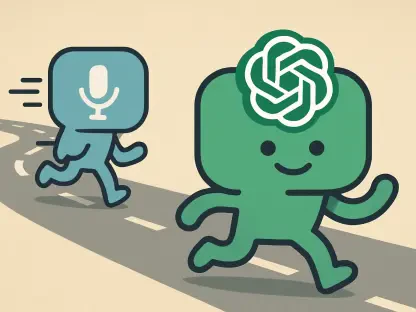The race to dominate the generative AI market has become increasingly competitive, with tech giants Microsoft and OpenAI leading the charge. Microsoft finds itself challenged by OpenAI’s rapid advancements, particularly with ChatGPT outpacing Microsoft’s Copilot. The debate intensifies over whether Microsoft can regain its footing and match the capabilities and market influence of OpenAI’s popular AI chatbot. This analysis delves into the current landscape while forecasting future industry shifts and strategic directions.
Competitive Landscape: A Clash of AI Titans
In recent years, generative AI has demonstrated remarkable growth, marked by significant technological advancements and increasing adoption across industries. Microsoft, having launched Copilot with expectations of leading the AI space, now faces stiff competition from OpenAI’s ChatGPT. Initially, Microsoft’s early investments in AI positioned it favorably, especially with the launch of Bing Chat. However, strategic missteps and branding challenges have hindered Microsoft’s progression, allowing OpenAI to assume a dominant position. This scenario underscores an urgent need for strategic realignment.
Branding and Strategic Hurdles
Navigating Brand Confusion and Differentiation
Microsoft’s approach to branding Copilot has been problematic, leading to consumer confusion. Despite its integration across various Microsoft products, the indiscriminate use of the Copilot brand has diluted its distinctiveness, complicating consumer understanding of its utility. OpenAI’s ChatGPT, by contrast, boasts a streamlined brand strategy that highlights clear product differentiation and user-friendly engagement. An exploration of Microsoft’s branding approach and potential avenues for differentiation is crucial.
Interaction Style and Personality Engagement
The contrasting personalities of AI chatbots can significantly impact user experience. Microsoft’s Bing Chat, particularly its “Sydney” mode, faced criticisms over unpredictable behavior, affecting public perception. This prompted Microsoft to implement restrictive caps on message length, inadvertently affecting user experience quality. Meanwhile, ChatGPT maintained engaging interactions, enhancing its usability and reputation. Assessing these differences illustrates the importance of developing a stable and engaging AI personality.
Technical Architecture and Interface Transparency
Microsoft’s Copilot has struggled with issues related to technical transparency and user engagement. Unlike ChatGPT, which offers clear customization options for language models, Copilot presents choices through a more opaque interface. This limits user control and customization capabilities, elements that are paramount for enthusiasts and professionals alike. Microsoft’s previous access to advanced AI models initially offered an advantage but has since been overshadowed by OpenAI’s robust development cycle. A focused examination of these factors highlights the necessity for Microsoft’s recalibration.
Emerging Trends and Industry Forecast
The generative AI industry is poised for transformative changes, influenced by innovations in AI models and evolving market dynamics. Experts predict that advancements from competitors like Google’s Gemini and Anthropic’s Claude may reshape user expectations and redefine the competitive landscape. Microsoft faces potential regulatory shifts and economic considerations that could influence future strategic approaches. This section provides insights into how Microsoft might navigate these changes, stressing the importance of adaptive strategies.
Strategic Recommendations for Microsoft
To counterbalance OpenAI’s success, Microsoft must consider several strategic adaptations. Enhancing the clarity of its branding and promoting transparency in AI interfaces are key elements to address. Emphasizing proprietary AI model development and fostering advancements that cater to current user demands could facilitate Microsoft’s resurgence in the generative AI market. These strategies not only bridge existing gaps but also offer a blueprint for technological and market success.
Reflecting on the Road Ahead
In retrospect, Microsoft’s endeavor to establish Copilot as a frontrunner has encountered substantial challenges. The comparison with OpenAI’s ChatGPT underscores the impact of strategic inconsistency and branding difficulties. Despite the hurdles, Microsoft’s foundational strengths and historical innovations provide invaluable resources for reclaiming market leadership. As the industry continues evolving, the imperative for Microsoft is to leverage insights from past missteps, embrace adaptive strategies, and potentially usher in a renewed era of AI excellence.









